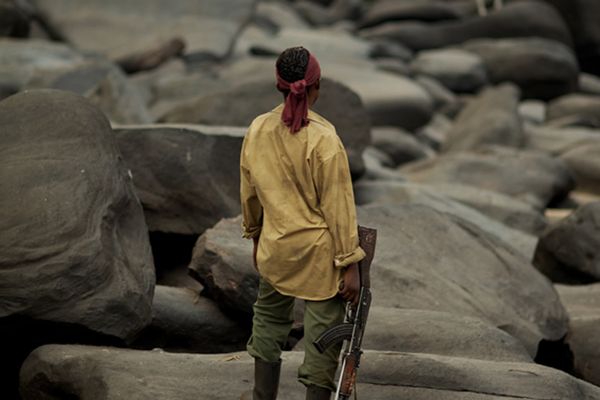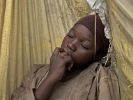Eye For Film >> Movies >> War Witch (2012) Film Review
War Witch
Reviewed by: Neil Mitchell

Every now and again a film seemingly appears out of nowhere to eclipse the majority of the year's other releases, and Canadian director/writer Kim Nguyen's fourth feature, War Witch, is one of those films. Combining the brutality of Jean-Stéphane Sauvaire's similarly themed Johnny Mad Dog with the nightmarish qualities of Elem Klimov's Come And See and the magic realist flourishes of Apichatpong Weerasethakul, Nguyen's tale of a female child soldier is no easy watch, but it's a film that demands to be seen.
Winner of numerous awards at the Berlin and Tribeca film festivals, including one for its lead actress Rachel Mwanza, a former street child and first time actor, War Witch is unflinching in its portrayal of atrocities, bold in its use of fantasy elements and intelligent in its representation of individual lives, families and countries facing up to the horrors of war.

Shot in the Democratic Republic of Congo, War Witch is set in an unnamed Sub-Saharan country ravaged by civil war, its shanty towns and inhospitable terrains recalling any number of African countries torn apart by bloody internal struggles. Heavily pregnant 14-year-old Komona (Mwanza) begins to recount her terrible recent past to her unborn child, admitting from the off that she doesn't know if she can love the child when its born. Switching to a flashback structure, Komona's confessional draws the viewer into a world of horrific atrocities – parenticide, rape, drug abuse, civilian massacres and battles with Government forces – as she is kidnapped and forced to become a child soldier for a rebel army. With only Magicien (Serge Kanyinda), another of the forced child soldiers, showing her anything resembling compassion, Komona's childhood becomes a living nightmare.
Partaking of 'magic milk', a peyote like substance given to the children by the adult soldiers to keep them subdued and compliant, Komona begins to have visions, seeing the dead wandering through the forest and jungle landscapes. It's a brave move by Nguyen to introduce magic realism into such a profoundly realistic and distressing narrative, but it's one that works. Their ghostlike, expressionless appearance a reflection of the hollow, zombie-like existence endured by the children. Komona's visions attract the attentions of the rebel leader, Great Tiger (Mizinga Mwinga), and she becomes his war witch - a prophetess charged with protecting his forces.
That's only part of the story though, as Nguyen pushes the narrative into different territories; an escape, a blossoming romance, further devastating turns of events, Komona's tortured conscience and moments of unforeseen humour and respite turn War Witch into a multi-layered reflection on guilt, love, history and humanity lost and regained. Nguyen cleverly flits between using frenetic close-up, hand-held shots during the intense battle sequences to more contemplative, graceful mid and long shots as the narrative opens out in the second and third acts. In doing so, the frantic immediacy of Komona's situation within the rebel army is replaced by a slower, longer term view as she begins to imagine some kind of future for herself and her unborn child.
This is no chest-beating, flag-waving war movie, no propaganda for conflicts past, present or future, War Witch is the story of childhood destroyed, a country in flames and of how we survive the worst of what (in)humanity throws at us. Komona's story is the story of every child soldier (regardless of gender) prised from their family homes or off the streets by unscrupulous adults and forced into committing the most barbarous of acts. Distressing, rich in metaphor and tinged with hope at the end (a personal hope that stands for a wider social hope), War Witch is generating Oscar buzz and rightly so. Directed with confidence by Nguyen, a film-maker I had no previous awareness of, and featuring uniformly impressive performances by a largely first time cast, this is a deeply impressive, moving and arresting film.
Reviewed on: 20 Nov 2012If you like this, try:
Children Of The CongoThe Devil Came On Horseback
The Other Side Of The Country
War Child















